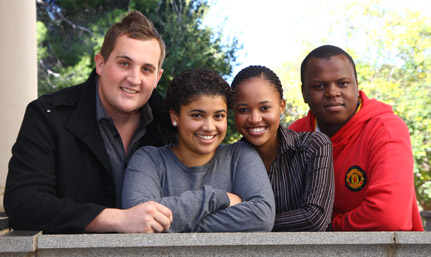|
 |
|
Golden Key International Honour Society members, Michael van Niekerk, Siobhan Canavan, Mpoi Makhetha and Cebolenkosi Sokhela, will travel to the USA and China, meeting the best in their career fields.
Photo: Hannes Pieterse
15 May 2013 |
They are amongst the top 15 percent of academic achievers at the university, and have been afforded the opportunity to travel abroad and meet with leading people in their fields of study.
Kovsie students Michael van Niekerk, Siobhan Canavan, Mpoi Makhetha and Cebolenkosi Sokhela, all members of the Golden Key International Honour Society, will travel to the USA and China. This trip is part of the International Scholar Laureate Program (ISLP) to learn how their career fields are practiced in another part of the world. The students are part of a select group of outstanding university students from across the world who will be given access to people, places and global perspectives in fields such as business, engineering, medicine, nursing, diplomacy and international relations.
Michael, a fourth-year MBChB student and SRC member of our Bloemfontein Campus, and Cebolenkosi, a third-year BSc Microbiology student will visit Washington, Philadelphia and New York in the USA. As part of the medicine delegation of the programme, they will visit clinics and hospitals to see how their study fields are practiced. Michael’s trip includes a visit to Johns Hopkins University in Baltimore, where he will meet representatives of the National Institute of Health, the largest source of funding for medical research in the world. He will also visit Harvard University in Massachusetts.
Mpoi, a third-year BSc Human Molecular Biology student, also forms part of the medicine delegation but will travel to China. "We will be exploring the ancient ways of healing versus the modern medical practices, exploring the medical systems of the country and meeting doctors and professors, visiting the rural areas, and of course, touring the best parts of China,” she said.
Siobhan, a third-year Media Studies and Journalism student, is part of the diplomacy and international relations delegation who will visit Beijing, Xi'an and Shanghai in China. "To me it's such an honour to be part of this programme,” she said. “It will give me the platform to not only represent who I am, but also my university and the values that the university has instilled in me. It allows me to be a part of something great that will benefit me in the end."